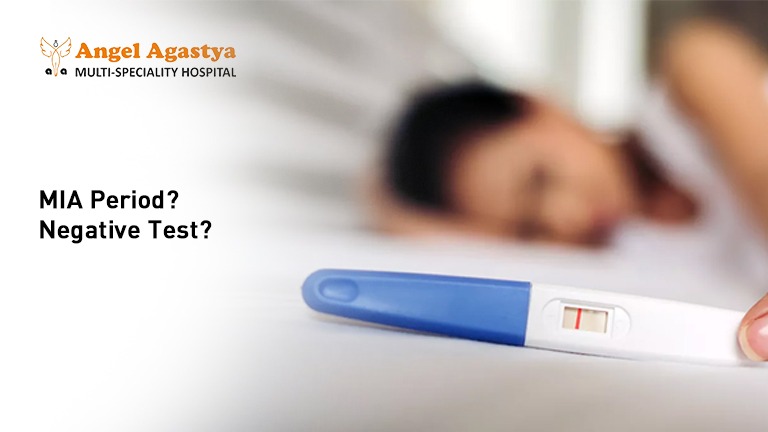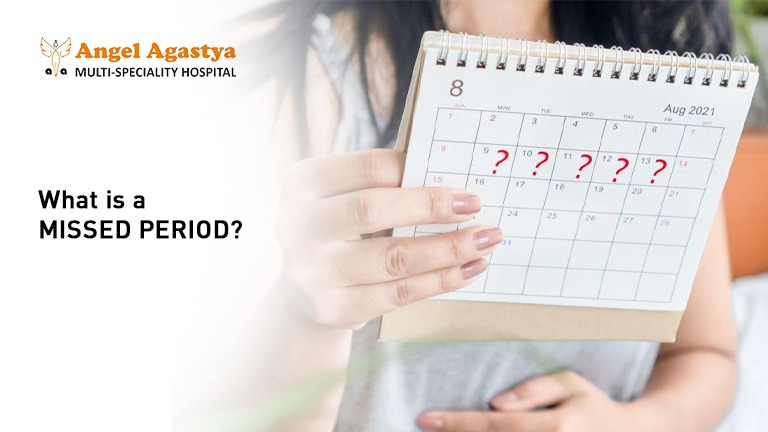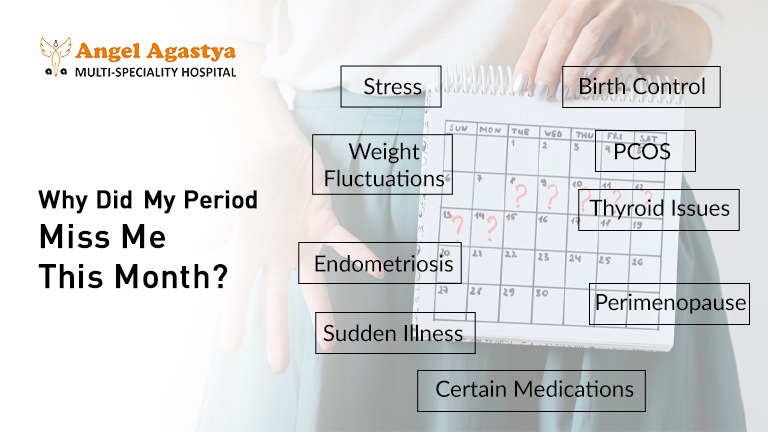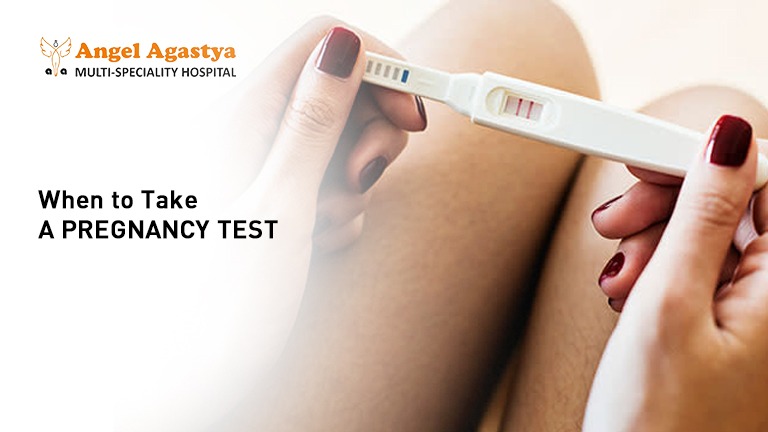Introduction:

Ugh, period week has arrived according to your calendar, but your trusty bathroom companion tells a different story. A missed period and a negative pregnancy test can leave you feeling like a detective in a confusing case – where’s the culprit? ️♀️ Take a deep breath, mama (or mama-to-be!), this isn’t uncommon. Millions of women experience missed periods for various reasons, and this blog is here to be your guide! We’ll explore the possibilities, debunk myths, and empower you to navigate this blip on your menstrual cycle.
What is a Missed Period?

A missed period simply means your period hasn’t arrived within your usual timeframe. Your menstrual cycle is the monthly process your body goes through to prepare for pregnancy. It typically lasts between 21 and 35 days, with your period marking the beginning of a new cycle. However, life can throw curveballs, and sometimes, your period might skip a beat.
Why Did My Period Miss Me This Month?
While pregnancy is a possibility, it’s not the only reason for a missed period. Here are some other common culprits:

- Stress: Feeling overwhelmed? Chronic stress can disrupt your hormones and delay ovulation, leading to a late or missed period.
- Weight Fluctuations: Significant weight gain or loss can impact your hormone balance and affect your menstrual cycle.
- Birth Control: Starting, stopping, or switching birth control methods can disrupt your cycle for a few months.
- Polycystic Ovary Syndrome (PCOS): This hormonal imbalance can cause irregular periods, including missed periods.
- Thyroid Issues: An underactive or overactive thyroid can affect your hormones and menstrual cycle.
- Endometriosis: This condition involves tissue similar to the uterine lining growing outside the uterus, and can cause irregular or missed periods.
- Perimenopause: As you approach menopause, your menstrual cycle can become irregular or stop altogether.
- Sudden Illness: A severe illness or infection can temporarily disrupt your menstrual cycle.
- Certain Medications: Some medications can affect your hormones and potentially cause missed periods.
Myth Busters: Missed Period Edition!
Let’s clear up some common misconceptions surrounding missed periods and pregnancy tests:
- Myth: You can’t get pregnant if you have a negative test.
- Fact: Pregnancy tests are most accurate when taken with first morning urine after a missed period. Early pregnancy hormone levels might not be detectable yet.
- Myth: All missed periods mean you’re pregnant.
- Fact: As discussed, there are numerous reasons for missed periods besides pregnancy.
When to Take a Pregnancy Test:

If your period is a week or more late and you’re sexually active, consider taking a home pregnancy test. For the most accurate results, use a first-morning urine sample with a reliable test kit.
When to See a Doctor:

- Your period is more than three months late.
- You have unusual vaginal bleeding or discharge.
- You experience severe pelvic pain.
- You suspect you might have a health condition like PCOS or thyroid issues.
Maintaining a Healthy Lifestyle:
Regardless of the reason for your missed period, it’s crucial to prioritize healthy habits:
- Balanced Diet: Eat plenty of fruits, vegetables, and whole grains to support your hormonal health.
- Regular Exercise: Aim for at least 30 minutes of moderate-intensity exercise most days of the week.
- Stress Management: Practice relaxation techniques like yoga or meditation to manage stress levels.
- Adequate Sleep: Aim for 7-8 hours of sleep each night for optimal hormonal balance.
Summary:
A missed period and a negative test can be confusing, but it’s not necessarily a cause for alarm. This blog explored various reasons for missed periods, busted some myths, and highlighted the importance of maintaining a healthy lifestyle. If you have further concerns or your period remains absent for an extended period, consult your doctor for personalized guidance.
FAQs:
What are some reliable home pregnancy tests?
Many brands offer accurate home pregnancy tests. Look for ones with over 99% accuracy.
Can a negative pregnancy test be wrong?
While home pregnancy tests are highly reliable (around 99% accurate after a missed period), a negative result can sometimes be incorrect. This happens in a few situations:
- Testing too early: Pregnancy hormones take time to build up in your urine. If you test before your missed period, the levels might be too low for the test to detect them.
- Test error: Expired tests or not following the instructions carefully can lead to inaccurate results.
- Unusual pregnancy: In rare cases, a condition called a cryptic pregnancy might not be detected by standard home tests.
Can I still get pregnant if I have irregular periods and negative tests?
Yes, it’s possible to conceive even with an irregular cycle and negative tests. If you’re actively trying to conceive and have concerns about irregular periods, talk to your doctor about ovulation tracking methods or underlying health conditions that might be affecting your cycle.
How can I regulate my menstrual cycle?
Maintaining a healthy weight, managing stress, and exercising regularly can help regulate your cycle. Tracking your periods can also be helpful in identifying patterns and potential issues.
What are some online resources for women’s health information?
Planned Parenthood (https://www.plannedparenthood.org/), American College of Obstetricians and Gynecologists (https://www.acog.org/), and The National Women’s Health Network (https://nwhn.org/about-us/) offer reliable information on women’s health topics, including menstrual cycles and missed periods.
Should I be worried if I have missed multiple periods?
If you’ve missed more than three consecutive periods, it’s advisable to consult your doctor. They can help determine the cause and recommend appropriate treatment.
Can birth control pills cause missed periods?
Yes, particularly when starting a new birth control pill or changing dosages. However, if you’ve been on the same birth control regimen for a while and experience missed periods, consult your doctor to rule out other causes.
Is it normal to have a missed period after stopping birth control?
Yes, it’s common to experience irregular periods for a few months after stopping birth control as your body adjusts. However, if your cycle remains irregular after several months, talk to your doctor.
Can I exercise too much and cause a missed period?
Excessive exercise can disrupt your hormonal balance and lead to missed periods. Aim for moderate-intensity exercise and prioritize rest and recovery.
What tests might my doctor perform if I have missed periods?
Your doctor might recommend a pregnancy test, blood tests to check hormone levels, or an ultrasound to examine your reproductive organs.
